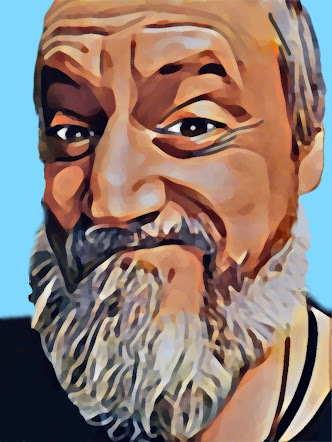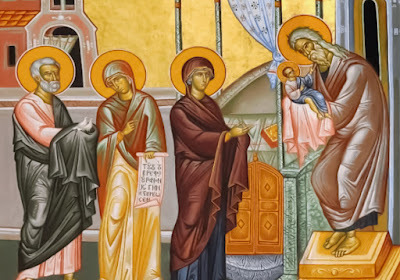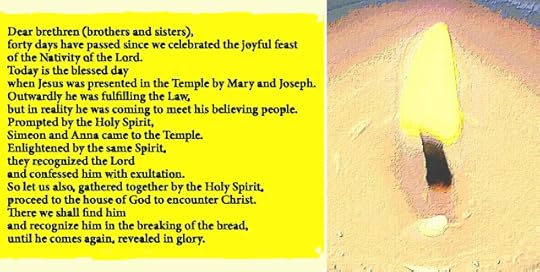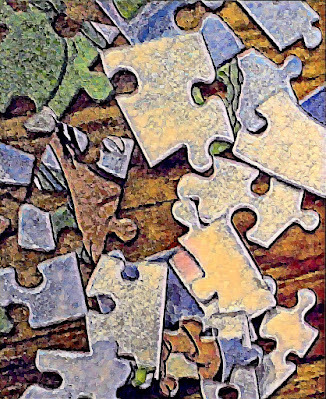John Janaro's Blog, page 82
February 15, 2022
What is the "Joy" of the Christian Life?
 Joy is one of the promised fruits of Christian life. But it is a very particular kind of joy, a joy that comes from a living relationship with God through Jesus Christ. It eminently corresponds to the deepest yearnings of the human heart, but also shares in the life of God, and therefore goes beyond finite human ways of understanding and measuring things.
Joy is one of the promised fruits of Christian life. But it is a very particular kind of joy, a joy that comes from a living relationship with God through Jesus Christ. It eminently corresponds to the deepest yearnings of the human heart, but also shares in the life of God, and therefore goes beyond finite human ways of understanding and measuring things.Christian joy is deep and foundational. It is an underlying reality of the new humanity that we receive from Christ, through the gift of the Holy Spirit. The heart of Christian joy is a participation, already begun here and now in the life of grace, in the very mystery of God's own infinite joy, of His life, of His glory. No experience in this life can simply be objectified, analysed, and classified as "joy-in-the-radical-sense," because it is God sharing His joy with us — the joy that is God Himself.
God elevates and purifies our affections, draws us through them, and gives us much help that strengthens us by illuminating and affecting our reason, and our psychological and emotional experiences. But even when we cannot "feel Him" in any way, we still believe in Him by faith and cling to Him in hope. We know that the source of our joy is with us, and that if we love Him, then we possess that invincible joy even if the world rages at us, even if sorrow seems to overwhelm us in the face of earthly loss, even if we are lonely, sick, imprisoned, or oppressed, even if incomprehensible pain fills our entire conscious awareness.
It is for our encouragement (not our discouragement) that the grace of the Spirit touched in special ways some of the martyrs and saints, so that they embraced suffering and even gruesome death "as if going to a wedding feast." But I think that God's Kingdom is overwhelmingly made up of saints who probably went through their deaths with considerably less enthusiasm. Many lived their lives with temperaments that would not be classified as "joyful" in the mundane sense.
The joy of God is lived within the love of God, and it realizes itself vitally within our personality in the measure in which we love God and our neighbor. The resonance within experience and the external signs of joy have different forms, different levels of intensity, and variations that correspond to the secret ways in which the grace of God is at work transforming mysteriously the particular person according to his or her own history, wounds, and suffering.
If we are patient and loving with people, we will be surprised by their joy as it peeks through like the sun on a cloudy day. And a glimpse of it will enrich us.
There are certain dispositions, a certain "personality type," and certain ways of living that we commonly identify as pertaining to a "joyful person" (and that we rightfully expect to find abundantly in a healthy Christian community). It is not surprising that joyful people have a zest for life, a ready smile, and a disposition for friendship and hospitality. It is not surprising that they are prepared to serve others, and to work for peace, justice, and reconciliation amidst the conflicts of life in this world. Joy by its nature manifests itself externally, but Christian joy is a light that shines in darkness, a transfiguring light that grows in the midst of the many limitations of our frail and wounded human nature. It is the beginning of our mortal humanity's being clothed with immortality. This joy that is the gift of the Spirit is a vitality always deeper and beyond any externally perceptible "ebullience" in human actions or emotional states. Rather, the working and fruition of Christian joy opens new perspectives, gradually transforms our awareness of the meaning of reality, and prompts us toward the real, concrete possibilities of self-giving love within whatever circumstances we are called to live each day.
Many will point out that life even in this world becomes more happy and fulfilling in general for those who love God. This is true, I think, because the foretaste and even the initiation of eternal life begins here and now, and gives a new depth of meaning to everything in our lives. But the unfolding and increase of joy are not formulaic and predictable. Everyone shares a common, redeemed human nature, but each one has a unique vocation that includes unique challenges, circumstances, sufferings, and constraints. Christ's presence brings healing to the whole person... but in different ways and in different qualities, always mysteriously and personally, not always obvious and evident to our limited measure for "the way things should be..."
Joy is certainly greater and deeper than what we consider to be "good feelings" about ourselves, others, life, or the ways of God. After the resurrection, Jesus didn't ask Peter: "Simon son of John, do you feel good about me...." He asked, "Simon son of John, do you love me...."
It is in our belonging to the Risen Christ that we have joy, and nothing can separate us from this radical joy: neither principalities and powers, nor the present or the future, nor the kings of the earth and their designs, nor persecutions, tribulations, pains, nor the tragedies of life, the loss of loved ones, the oppression of harsh task-masters, nor sufferings, nor piercing screams from some horrendous illness or injury (whether it is us who scream, or the person we love most in the world whom we must accompany even when there is nothing we can do to stop the pain), nor the harrowing abysses of psychiatric disorders, the feelings of darkness and "deadness" of neuropsychiatric depression, the mental diseases that cause irresolvable anxiety and obsessions that rage like fire in our brains, nor the implacable daily unseen torture of a chronic illness that no one else seems to understand, nor any of the countless ups or downs of life — extraordinary or ordinary — that we can imagine.
When we hear that the mark of Christianity is joy, we shouldn't say, "Oh, I don't feel joyful, so I guess I'm not a real Christian." Rather let us say, "No matter how I feel, my joy is in Christ and in belonging to Him."
Certainly when we say this, let us examine ourselves, and see to what extent we are truly open to ways that the Spirit wants to fill our hearts with the joy that corresponds to our own vocations and circumstances. Let us ask the Lord to increase our joy, nourishing it through prayer and encountering Jesus in the sacraments, in our neighbors, especially in the poor who need our attention, solidarity, and merciful love. Let us seek forgiveness for all our sins (which never bring true joy in themselves, although our sorrow over them is already the beginning of joy). And let us live in hope, because the life of God is our joy, and His love is stronger than our sins, our suffering, our wounds, our frailty.
We have confident joy because He has reached down to our deepest need. God has joined Himself to us in the most desolate places of our pain and tribulation. Jesus is with us, and our wounds belong to Him; they are His wounds, forever. Joy is the revolution born from these transfigured open wounds, open forever in His resurrected body, because of His love which He gives to us.
The joy of this love becomes mysteriously radiant even within all the moments of this present life — this often arduous journey — because love bears all things, believes all things, hopes all things, endures all things (1 Corinthians 13:7). In His love we keep going, we hope, we desire, we offer, we trust, we cry out for God, we never give up.
February 12, 2022
Bare Branches, Waxing Moons
February 9, 2022
Maria’s Got a Good Grip
Maria is getting quite curious and purposeful; she also likes to GRAB things that interest her, like Papa’s beard!🤭☺️ (Most recent VIDEO below.)

February 8, 2022
The Hope of Heavenly Grace
 *********************************************************
*********************************************************Here is the beautiful Collect Prayer from the liturgy for this week.
We place our hope in the Lord's immense love, His "protection" and "unfailing care." He has poured out for us His "heavenly grace" through His Son Jesus Christ, who died and rose for us, who reveals the depths of God's love. Jesus sends the Holy Spirit to form us into children of the Father - His brothers and sisters - and He remains in our midst, He dwells with us in His Church.
He travels the roads of the world and all of human history, and He calls every human person to Himself through our prayer and witness as members of His Body, and through the mysterious workings of the Holy Spirit in their hearts.
We rely "solely on the hope of heavenly grace," which is given to us and to the whole world through Jesus Christ the sole redeemer of humankind, the center of the cosmos and of history, the meaning and destiny of the life of every person.
February 7, 2022
“Faces” and “Winter Scenes” from JJDigitalArtStudios
 Self-Portrait? I’m not quite so wrinkled yet. I scrinched up my face deliberately in the original model photo.
Self-Portrait? I’m not quite so wrinkled yet. I scrinched up my face deliberately in the original model photo.I have been working a lot with images lately. The vast majority of my pictures never get posted, including some that I think are pretty good. The reasons why I share some things here or on other platforms are not clear to me. I know that I would rather not post something unless I feel that I’m “done” with it, and that it might have value for others. There are many other “works-in-progress” and even more “clutter” (fortunately, it’s virtual clutter).
Tools for visual creativity on the Internet are in an “expansion mode” right now. I don’t even have the “fancy stuff.” But I have improved my “digital palette” quite a bit over the past year, and I have extended my study to portraiture (mostly with myself as a “model,” along with a few athletes and celebrities whose images are everywhere). I have no interest in outlandish facial distortions, combining human and animal faces, and all that weird stuff. But the overall capacity to render a photographic portrait in cartoon form, and to vary light, shadow, colors, textures, etc. are things that I have been doing, even as the different possibilities for “presenting the human face” seem to be increasing by the week as the AI technicians try to outdo one another.
The geography of the human face is inexhaustible and full of wonders. Some of the techniques aim to remove all flaws and transform “AI faces” into bland avatars. Much is lost in this obsession with homogeneity. Portraits have their origins in the impressions of real faces that belong to real persons, however much change or originality the artist might introduce. For me, the dignity of the human person remains foundational, whether presenting an image that represents someone real (in which case I hope not only to respect, but to honor such persons) or constructing a “fictional face” which remains a type of our humanity and the persons who share it as our brothers and sisters.
I don’t know how much the present “AI technique boom” will really be useful. Most of the trending themes are fads. I am trying to discern what has value for my own artistic purposes (and trying to keep those purposes focused). My work leads to many dead ends, with some occasional progress, and virtual clouds full of failed experiments. But no sheets of paper are used. No trees have to die for my art.
Speaking of “dead trees” (and some live ones too) here are some “Winter Scenes” from 2022 thus far:






February 5, 2022
Saint Agatha: “Possess All That I Am — You Alone!”
 “Jesus Christ, Lord of all things! You see my heart, you know my desires. Possess all that I am — you alone!”
“Jesus Christ, Lord of all things! You see my heart, you know my desires. Possess all that I am — you alone!”
Centuries of devotion to Saint Agatha of Catania attribute these words to the heroic fourth century virgin and martyr. Catania on the coast of Sicily was long part of the Greco-Byzantine world; thus Saint Agatha is much loved to this very day by the Eastern churches. She is also one of the martyrs mentioned in the Roman Canon (the ancient Eucharistic Prayer of the Roman Rite).
Through the centuries, in every place and time, in every culture, from men and women of every social status, words like these have been spoken and people have strived to be faithful to them: “Jesus, I give you everything.” Who is this man, Jesus, that people give him themselves, entrust their whole selves to him? Who is this man that people die for him, and live for him?
February 4, 2022
Fatherhood: Love Always Creates Freedom
 Parenthood involves many sacrifices (as well as joys, of course). It is an ongoing journey of self-giving, attentiveness to others, and different kinds of suffering that are hard to grasp concretely until one experiences them. One can only be a good parent insofar as one is willing to die to one's self with trust that the value of one's efforts is beyond one's measure. Patience, purity of heart, and "poverty of spirit" are necessary in parenthood, as they are in all authentic ways of loving persons.
Parenthood involves many sacrifices (as well as joys, of course). It is an ongoing journey of self-giving, attentiveness to others, and different kinds of suffering that are hard to grasp concretely until one experiences them. One can only be a good parent insofar as one is willing to die to one's self with trust that the value of one's efforts is beyond one's measure. Patience, purity of heart, and "poverty of spirit" are necessary in parenthood, as they are in all authentic ways of loving persons.Nevertheless, I have long struggled with the temptation to regard my fatherhood within the context of our Western culture’s dominant mentality of “success,” external achievement, self-assertion, and wealth-as-possession-of-things. After all, I haven’t had much worldly success to brag about. But at least I’m the father of five (four young adults and one teenager still at home). Now I'm a grandfather too, right? Congratulations to me! And they are all "good kids." In fact, we often hear that they are remarkable and exceptional young people.
I recognize that it's appropriate to find satisfaction in my family, and to be immensely grateful and joyful for them - not so much because they represent a "job well done" overall (thus far), but above all because I love them.
Love is a gift and a mystery that calls forth much human effort - much work, responsiveness, attention, cultivation, openness, and vulnerability - but it’s never reduced to something we “produce” and “control.” Love is personal and interpersonal. Human love is always a gift, a source of wonder, a vocation, a sign of the transcendent Mystery for whom we were all made.
Most of my kids have grown up during the course of this blog, and I have begun to grow "old." The relationships are still real, personal, and woven-together, flawed, and "complicated" in ways that only family relationships can be. Still, their modality has changed (and continues to change). It used to be noisy around this house. Now it has become much quieter ... except when Maria is here!😉 Perhaps, in the future, it will be noisy again (at least sometimes) with the rumble-tumble of numerous grandchildren - siblings and cousins - running all over the place.
In any case, life will continue to change. Things can only grow by changing, and human persons can only grow in love by changing freely, by using their freedom to deepen their own relationship to goodness, by opening up to embrace their destiny.
Pope Francis commented vividly on these points - in the context of the meaning of fatherhood - in some recent reflections about Saint Joseph. He sheds light here on the inherent dynamic of genuine fatherly love in particular, in a way that is true for all love, and that points also to the centrality of freedom for the fulfillment of every person. Here are some of Francis’s words that I found especially significant and helpful:
"One of the most beautiful aspects of love, and not only of fatherhood, is indeed freedom. Love always creates freedom. Love should never become a prison, a possession. Joseph shows us his ability to take care of Jesus without ever possessing him, without ever wanting to manipulate him, without ever wanting to distract him from his mission.
“I think that this is very important as a test of our capacity to love and also our capacity to know how to take a step backwards. A father is good when he knows how to remove himself at the right time so that his child can emerge with his beauty, with his uniqueness, with his choices, with his vocation. In this sense, in every good relationship, we have to give up wishing to impose from on high, an image, an expectation, indeed a visibility, completely filling the scene with excessive protagonism.
“The wholly ‘Joseph-like’ characteristic of knowing how to step aside, the humility that is the capacity also to slip into second place, is perhaps the most decisive aspect of the love that Joseph has for Jesus. In this sense Joseph is a very important character, I dare say an essential one, in Jesus’ biography precisely because at a certain point he knows how to step away from the scene so that Jesus can shine in all his vocation, in all his mission.
“Faced with the image of Joseph, we have to ask ourselves if we are capable of knowing how to take a step back, to allow the other, and especially those entrusted to us, to find in us a reference point, but never an obstacle."
February 2, 2022
The “40th Day of Christmas” - an Epiphany in the Temple
 Today we have celebrated the solemn Feast of the Presentation of Jesus in the Temple.
Today we have celebrated the solemn Feast of the Presentation of Jesus in the Temple.It has now been 40 days since Christmas, when we recalled with joy the birth of Jesus, the Word made flesh who has come to dwell with us, to reveal the glory of God and the immeasurable depths of His love for us.
Today Jesus is brought to the Temple in Jerusalem by Mary and Joseph in accordance with the Mosaic Law. Here He is revealed to the faithful of the Old Covenant who have ardently awaited His coming. By the grace of the Holy Spirit, there are a few who recognize the baby Jesus as the Messiah in this joyful "epiphany," as Simeon testifies: "My eyes have seen the salvation which You have prepared in the sight of all nations. A light of revelation to the Gentiles and the glory of Your people Israel" (Luke 2:30-32).
Then "Simeon blessed them and said to Mary his mother, 'Behold, this child is destined for the fall and rise of many in Israel, and to be a sign that will be contradicted—and you yourself a sword will pierce—so that the thoughts of many hearts may be revealed.'" (Luke 2:34-35).
Since Jesus is the "light of revelation," today is also a special day for the blessing of candles, "Candlemas." One month from today, we begin the liturgical season of Lent, in penance and preparation for the observance of that Holy Friday when Jesus takes our sins upon Himself... and the Resurrection of Easter Sunday.
Christ is our Light in every darkness.
******************************************
At the beginning of today’s Mass, there is often a formal procession, where this beautiful prayer is used:

January 30, 2022
Eleven Years of Blogging
It's time to mark the 11th anniversary of the Never Give Up Blog by remembering how it all began. The year 2011 was a decent stretch of time ago. That first day's "double post" is reproduced below. Much has happened since then, circumstances have changed, decisions and events have occurred, people have died and people have been born.
The truth remains always. Perhaps we are learning a bit more, growing a little, growing into wisdom. As Luigi Giussani said, "No gesture exists that does not involve the whole world. That's why we get up every morning: to help Christ save the world, with the strength we have, with the light we possess, asking Christ to give us more light and more strength."

January 29, 2022
Does Life Seem Like a “Broken Puzzle”?
 Our lives are a “puzzle” and we can’t figure out for ourselves how the pieces are supposed “to fit together.”
Our lives are a “puzzle” and we can’t figure out for ourselves how the pieces are supposed “to fit together.”We didn't bring ourselves into being, and we don't know what to do with the inexhaustible longing of our hearts. Moreover, we find ourselves “broken” but we can't fix ourselves. We don’t know how to escape our own solitude and sadness.
Instead we tend to harm ourselves and one another, and we fail to seek the One who is the true Source of our being and of all the truth, goodness, and beauty of reality. This might seem like the inescapable lot of the whole human race and of each one of us, in spite of all our desperate efforts to be “optimistic” and successful, and our pretenses to care about one another. We might easily become convinced that life has no reason, that everything ends in absurdity, and that all we can do is distract ourselves from moment-to-moment while time inexorably passes us by.
But Jesus is with us. He has come to dwell with us. He knows us even before we realize it, and He always knows us more deeply than we know ourselves. He looks upon each of us with an ardor and a compassion that is infinitely greater than the way we see our own selves, or one another.Jesus is present, generating us, sustaining us, redeeming us, calling us, forgiving us, empowering us, attracting us, drawing us to His embrace.
We must never give in to discouragement, never give up, never let cynicism suffocate our hope or silence the plea for a worthy and meaningful existence, for happiness, fulfillment, communion - this plea that is always crying out from the deepest places within us.
He is listening. He hears us crying out. He understands our cries, our sorrows, our need.
This is something to remember in the midst of the many necessary struggles of life, and all our genuine and important efforts for justice and healing, respect and love, work and growth. We must remember again and again that His love for us is a real fact. And we must let His Spirit work within our hearts the liberating response of gratitude and trust.
Everything else that matters has its roots here.





